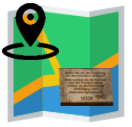


Since the 5th of October, the first wooden drifters have been released into the North Sea for research purposes. If you find a drifter, you can participate in the project and report your drifter observation through the web portal or via smartphone. Under the link "Report Drifter" you will find a short guide and more links to the Report Portal as well as to the BeachExplorer apps.
If you have found and reported a drifter, you may keep it; otherwise, please release it back into the water at the same spot where you reported it.
Many thanks in advance! We wish you a nice day at the North Sea!
Marine litter pollution…
has become a growing global issue which has already shown to have significant impacts on marine ecosystems. The research project presented here aims to acquire solid, scientific knowledge and an understanding of current and future distribution patterns of plastic litter along the coast and shorelines of north-west Germany, including the East Frisian Islands. It also aims to identify potential litter sources and polluters. The ultimate goal is to collaboratively develop mitigation strategies for this environmental problem.
In order to achieve these aims, an interdisciplinary consortium was formed, involving physical oceanographers, physicists, geoecologists, biologists and environmental planners. This team will investigate the pathways of floating macroplastics and the extent of this pollution through high-resolution numerical models which also allow backtracking of particles to their regional sources. Thereby, it is possible to identify main polluters (e.g. shipping lanes, rivers, tourism). Furthermore, coastal observation systems will be set up to record hydrodynamic patterns (i.e. waves, currents, drifters). Monitoring concepts and analyses of beached litter data from the North Sea coastline and major rivers will additionally be developed to allow an insight into varying spatio-temporal changes.
By involving the public and relevant stakeholders in the project, behavioural patterns in regard to plastic pollution will be examined. These findings will in term contribute to developing solution strategies, including the set-up of a system through which citizens can actively participate in recording litter via smartphone and web services.
The results of this project will provide local administrative as well as non‑governmental organisations (The Wadden Sea National Park, Lower Saxon State Department for Waterway, Coastal and Nature Conservation etc.) with sound, scientific data on plastic pollution, up-to-date knowledge of the most important sources, pathways and accumulation areas as well as possible action plans.